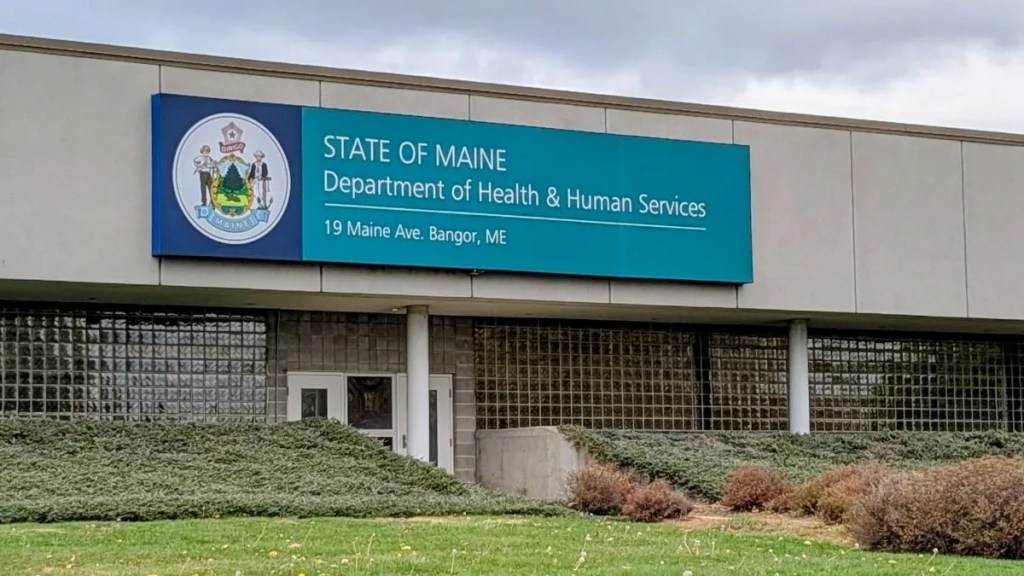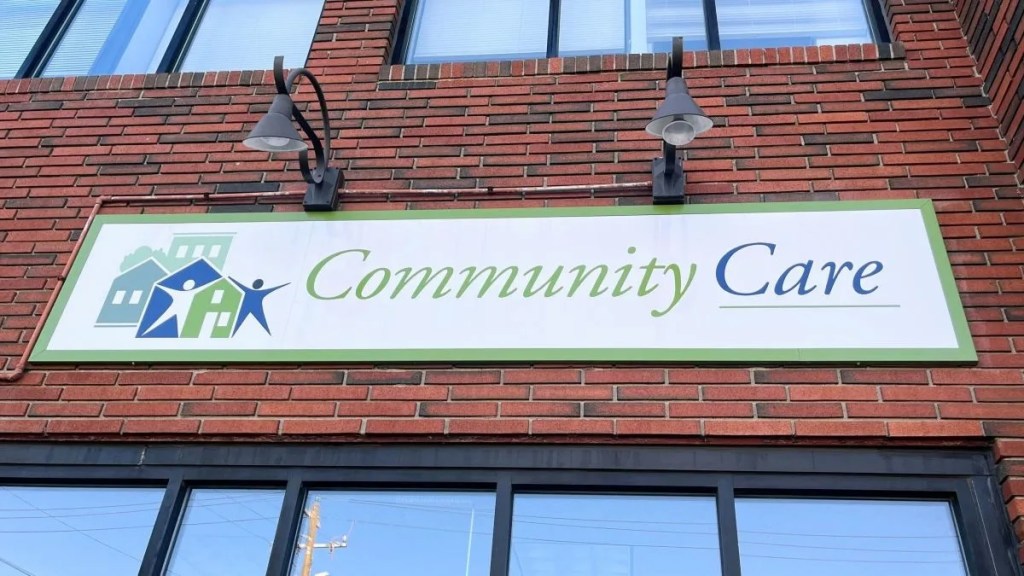
Maine is required to arrange visits between parents and children within seven days after the state removes children from their homes due to concerns about abuse or neglect. Typically these visits can only occur if they are attended by a supervisor who takes notes on the interactions between parents and children, and can step in to protect the child’s safety.
There is broad consensus among those involved in the child welfare system that these visits are important for the parents who have just had their children taken from them, for the children who have undergone the trauma of being removed from their home, and for maintaining a bond between parent and child necessary for reunification.
But in nearly all cases, Maine’s largest contracted provider of visitation services failed to schedule the visits within the state’s required seven-day time frame last year, according to a Maine Monitor analysis.
The nonprofit Community Care contracts with the Maine Department of Health and Human Services to arrange and supervise visits in Maine’s south and west, but it scheduled those visits within the required time frame just 10% of the time in 2024, according to performance data it submitted to the state and which was obtained by The Monitor.

Last year, it scheduled just 30 of the state’s 276 referrals within seven days, falling far short of the terms of its state contract, which mandated 90% of those referrals be scheduled in that time frame.
Despite the organization’s poor performance the previous year, DHHS signed a new contract with Community Care in December, according to state records. The new contract increased the hourly rates the agency charges for supervised visit services, which hadn’t been raised in several years.
The new contract authorized Community Care to invoice the state up to $292,791 per month, or about $3.5 million a year.
The performance data show that sometimes parents and children may wait weeks or months between the time the state makes a referral and when a visit is scheduled by the agency. The median length of time between a referral and a visit was 29 days, according to the Monitor’s analysis.
Community Care, which is headquartered in Bangor and has 13 satellite offices, did not respond to interview requests or a list of emailed questions.
“That current providers are not providing expected services is of serious concern to the Department, and we are continuing to closely monitor their performance to ensure that timely visitation continues,” Alisa Morton, a DHHS spokesperson, wrote in an email.
Morton didn’t answer a question asking if DHHS had taken steps to improve Community Care’s performance, claw back taxpayer money or find another provider. Instead, she wrote to The Monitor that “providers are paid only for services delivered.”
Other state-contracted supervised visitation providers performed far better than Community Care in 2024, suggesting that challenges facing Maine providers — staffing or otherwise — may be overcome.
Community Care’s poor performance and the state’s acceptance of it not only prevent children and parents from seeing each other after the trauma of removal, but delay reunification, lengthen the time cases take to resolve, and burden DHHS caseworkers who must step in to arrange and supervise visits to comply with Maine law, according to experts, state watchdogs, child welfare attorneys and caseworkers.
DHHS said the agency uses caseworkers, resource parents and others to ensure families get “timely” visits when their contractors fail to provide them. It’s unclear, however, how often caseworkers ensure parents and children get their visits within seven days when outside agencies fail to do so, as DHHS did not respond to a question seeking statistics on the state’s success in meeting the seven-day requirement.
DHHS does not appear to track that data across cases. Lindsay Hammes, another DHHS spokesperson, wrote in an email that information about when parents and children get their first visits after removal is “documented within individual case files.”
Regardless, the practice of DHHS caseworkers picking up the slack for state contractors adds to the caseworkers’ already “impossible workload,” according to a statement from their union.
The visits must happen for DHHS to comply with court orders in child custody cases, wrote Tom Farkas of the Maine Service Employees Association, Local 1989.
“However, supervised visitation providers often tell caseworkers they don’t have any openings, or they will only drive certain distances — and sometimes supervised visitation providers don’t respond at all to caseworkers trying to schedule visits,” Farkas added.
The Monitor obtained the 2024 data through a public records request that initially asked for contract performance metrics covering 2023 and 2024. DHHS took six months to fulfill the request and only provided data for 2024. The department declined a request to interview Bobbi Johnson, director of the Office of Child and Family Services, which oversees child protective services.
Attorneys involved in child welfare proceedings found the data troubling.
“Who is holding Community Care accountable?” asked Taylor Kilgore, an attorney who represents parents in child protection cases and is based in Androscoggin County, where Community Care operates. “Where in OCFS has anybody said, ‘We gave you a contract, and you’re not doing it?’”
Community Care is the contracted provider for five of Maine’s eight DHHS districts, having expanded its footprint in 2023.
One of those is District 2, which encompasses Cumberland County. Community Care scheduled just two of the 55 referrals it received in 2024 within seven days. It met its benchmark 3.6% of the time, the worst rate among all districts.
The numbers are, unfortunately, not surprising, said Michael Dixon, a Portland-based attorney. He serves as a guardian ad litem, which is a court-appointed lawyer responsible for advocating for the best interests of the child in child protective cases.
“I can definitely attest to the breakdown,” said Dixon, who handles Cumberland County cases. Dixon said there are times when visits are not in the best interest of the child, but those cases are rare.
“Babies being removed and then not being allowed to see the parent that they’ve just begun bonding with, that’s horrific,” Dixon said. “But a child of any age needs to see their parent again.”
At least one judge has chided the department for its lack of visitation resources, a 2023 termination of parental rights ruling obtained by The Monitor shows. Child protection proceedings are confidential under Maine law.
In her ruling, Cumberland County District Court Judge Jennifer Nofsinger said it was “simply not acceptable” for the mother and her child to have had just one visit in three months.
“The department should have had more resources available to make up for missed visits that resulted from forces outside of [the mother’s] control and to offer more time slots that met [the child’s] and [the mother’s] needs,” the judge wrote.
She went on to conclude, however, that the lack of visitation did not ultimately change the outcome of the case.
State watchdogs have also raised concerns about visitation services.
In 2024, the Office of Program Evaluation and Government Accountability, which provides independent oversight of state government, wrote that inadequate visitation was adding to the workload of already overburdened DHHS staff and “potentially lengthening the time to reunification.”
The same year, the Maine Child Welfare Services Ombudsman office wrote in an annual report that “a shortage of professional visit supervisors causes hardship to families with children in state custody and takes case aides and caseworkers away from other important work.”
“Frequent visits are one of the most important things for children who have entered custody, as well as for parents who are in the process of reunification,” the ombudsman, Christine Alberi, wrote in an email.
Other visitation providers, operating in more rural areas than Community Care, performed far better.
AMHC, a community behavioral health clinic based in Presque Isle, is the contracted provider of supervised visits in Aroostook, Hancock and Washington counties. It also failed to meet the terms of its contract but outperformed Community Care. The agency scheduled appointments within seven days 48% of the time in 2024, or for 72 of 150 referrals. AMHC’s median wait for a visit was seven days.
Bobbie Chasse, Aroostook County children’s program manager at AMHC, declined an interview request. Chasse wrote in an email that she was “unable to share operational details” about why the agency had fallen short of its contract benchmarks but added “there are varied reasons why a family may not be seen within 7 days. AMHC works very closely and is in regular communication with our State of Maine DHHS partners and contract leads to meet the needs of the children and families we serve.”
Bangor-based Penquis Community Action Agency was the only one of the three providers to exceed the contract benchmark. The nonprofit is the state’s supervised visitation provider for Penobscot and Piscataquis counties.
Last year, Penquis scheduled 197 of 212 referrals — 93% — within seven days. The agency’s median wait for a visit was just five days.
Penquis Director of Family Enrichment Services Tamar Mathieu declined a request for an interview. In an email she wrote, “I can’t share specific operational details, but we are proud of our team’s efforts and remain focused on meeting expectations.”
Asked why Penquis was able to meet its contract target while Community Care and AMHC were not, DHHS spokesperson Morton said that Penquis had a smaller area to serve.
“Penquis operates in a single district and primarily within one county, which reduces the logistical complexity faced by providers that must cover multiple districts or wider geographies,” Morton wrote in an email.
Nearly all children removed from their homes begin with supervised visits, but cases can transition to visits that allow more privacy between the parent and child. During what are called monitored visits, for example, a supervisor might check in on the family periodically, rather than watch them continuously.
The state has contracted with Fair Shake, a for-profit company, to provide the less restrictive, monitored visitation. The company, founded and owned by two parent attorneys, provides visit rooms filled with toys and furniture that are video-monitored by an operator who can watch several rooms at once. The video is recorded and can be used in child welfare court proceedings. The model requires less staffing, but it can’t accommodate the one-on-one requirement of supervised visits.
Although it provides monitored, not supervised, visitation, Fair Shake scheduled visits within seven days of referrals 95% of the time between April and December 2024, according to state data.
Fair Shake opened an office in Newport in 2021 and in Lewiston last year. The offices are open on weekends and after work hours, a concession to parents’ and children’s schedules not made by other agencies, co-founder Wayne Doane said.
The state could change its relationship with visitation vendors. On Sept. 30, the contracts with Community Care, AMHC and Penquis expired. The state is currently working on finalizing temporary amendments to extend the contracts. It anticipates issuing a request for proposals for visitation services in all districts in early 2026, DHHS spokesperson Hammes wrote in an email.
This story was originally published by The Maine Monitor, a nonprofit and nonpartisan news organization. To get regular coverage from The Monitor, sign up for a free Monitor newsletter here.